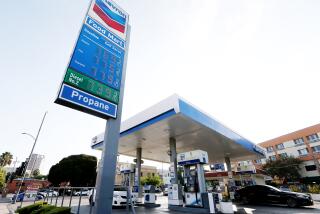U.S. pump prices surge in Ike’s wake
- Share via
Motorists far from the Gulf Coast on Sunday continued to feel the ripple effects from Hurricane Ike’s trek through refinery-rich Texas, as the cost of gas throughout the Midwest and East leaped higher, going above $5 a gallon at a growing number of stations.
The $5-plus service stations weren’t all that common, but they provided an exclamation point to Ike’s effect on gas prices. Weekend jumps of 30 to 60 cents weren’t out of the ordinary in some regions and helped kick the nationwide average cost of self-serve regular to $3.795 a gallon Sunday, a 12-cent hike since Friday.
Five states -- Georgia, Illinois, Indiana, Michigan and South Carolina -- joined usually high-cost Alaska and Hawaii with statewide averages above $4 a gallon. In South Carolina, the average price hit a record high.
The vagaries of pipeline operations and the timing of fuel deliveries created price disparities in many markets. In Tennessee, price spotters for GasBuddy.com reported that a Shell station in Clinton was selling regular for $5.09 a gallon Sunday, while another Shell in the same city carried regular at $4.79 a gallon.
Though some consumers and state officials hinted that stations could be gouging customers, Tom Kloza, chief oil analyst at the Oil Price Information Service, said the higher prices probably were based on wholesale gas prices that jumped in the Gulf Coast before Ike hit land.
Stations raised their street prices when they got fuel deliveries pegged to the higher wholesale prices, he said. “Their next deliveries were at $4.50 a gallon . . . it’s one of the reasons you see these huge disparities in price.”
Large oil companies have deep pockets, allowing them to sell gas to their dealers at less than the going price, but independent operators are charged full price immediately and have to pass the increase on to customers, Kloza said.
The high prices should be relatively short-lived because Ike didn’t deliver the debilitating blow to refineries, pipelines and ports that some had feared. Restarting those operations, however, will depend mostly on restoring power to the facilities.
Government officials reported that at least 10 oil platforms were destroyed, the first indication that Ike delivered far more damage offshore than Hurricane Gustav did. But with refineries still down and U.S. fuel demand in decline, oil production is less crucial right now.
“We’re going to be coughing and wheezing in terms of supply for a couple weeks or so,” Kloza said. “A lot of days of [fuel] production were lost.”
Even so, he said, “by Wednesday or Thursday, it’s not going to be a big story.”
During electronic trading in oil futures, which opened earlier than normal Sunday, traders’ attention appeared to be diverted by the spreading meltdown in the financial world, where investment bank Lehman Bros. Holdings Inc. teetered on the edge of bankruptcy protection and Merrill Lynch & Co. agreed to a buyout. The cost of oil for October delivery fell as low as $98.46 a barrel, but by late Sunday it had rebounded to $99.61. On Friday, oil briefly traded below $100 for the first time in more than five months but closed at $101.18.
In Texas, 14 refineries remained closed Sunday, representing about 20% of the nation’s oil-processing capacity. But a growing number of refiners were reporting that their plants sustained little or no damage from the hurricane.
Pipeline operations, also shut down as a precaution, were restarting Sunday. But with refineries still down, fuel deliveries to the Northeast, Southeast and Midwest were slowed.
Nearly all Gulf of Mexico oil and natural gas production remained shuttered Sunday, the government reported.
The Energy Department said it would deliver 200,000 barrels of oil from the Strategic Petroleum Reserve to ConocoPhillips’ Wood River, Ill., refinery in exchange for oil at a later date. After Gustav, the agency provided oil from the reserve to Placid Refining Co.’s refinery in Port Allen, La., and to refineries owned by Marathon Oil Corp.
--
elizabeth.douglass @latimes.com
More to Read
Sign up for Essential California
The most important California stories and recommendations in your inbox every morning.
You may occasionally receive promotional content from the Los Angeles Times.










